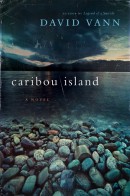 In Vann’s first novel, Gary and Irene, married three decades, test their already strained union by attempting to build a cabin on a remote, barely populated Alaska island. It’s Gary’s crazy idea, and several reviewers say the book fits neatly into a certain obsessed-male paradigm. Kevin Canty in the New York Times is one of them, but he says Vann puts an important spin on things:
In Vann’s first novel, Gary and Irene, married three decades, test their already strained union by attempting to build a cabin on a remote, barely populated Alaska island. It’s Gary’s crazy idea, and several reviewers say the book fits neatly into a certain obsessed-male paradigm. Kevin Canty in the New York Times is one of them, but he says Vann puts an important spin on things:
This is familiar territory for a certain kind of masculine writing: man, will, danger, water, trees. We can trace the moment back to Lord Jim and Big Two-Hearted River and even The Sportswriter, the lonely, suffering man expressing himself through action. What’s canny about Vann’s version is his decision to cast the scene from Irene’s point of view, to see it with her eyes and feel it with her heart and watch her try to make sense of it.
John Self says, “To those wishing to cut to the chase of this novel, the executive summary is: Richard Yates in Alaska. The dominant qualities which are both fairly and unfairly assigned to Yates are present here: depictions of human weakness and domestic blitz, a delightfully sour willingness to take the reader to the very end of their rope, and a brutally honest examination of a man’s worst qualities.”
Ron Charles in the Washington Post gives a sense of the book’s mood as the couple plunges into the project: “they haul and saw and hammer, ripping into each other with accusations and resentments stored up over 30 years, both of them baffled by the ruin of their marriage. That they love each other makes their irritation all the more painful as they labor on, often soaking wet, frequently in the dark, in subzero temperatures.”
For Caitlin Roper in the Los Angeles Times, the book’s chorus of characters, which includes Irene’s grown daughter and her depressive boyfriend, brings it to vibrant life: “The book is powerfully propulsive, in part because Vann organizes chapters and sections from each of these characters’ points of view — and these alternations temper the claustrophobic misery of Irene and Gary’s relationship and create a dizzying momentum as well. . . . Vann’s writing is confident — concrete and efficient. His characters’ emotions and experiences bleed directly into the reader.”
Canty, who liked the decision to see things through a woman’s eyes, is still torn over the final result: “Vann does establish these women as characters of stature, fully rounded and perceptive. I just expected more from them: more action, more awareness, more will and more feeling. This creates a narrative drag, too: the underlying situation is established early and never grows more complicated, never really changes.”
Ian Crouch in the New Republic’s Book is perhaps least impressed, comparing the book unfavorably to Vann’s debut collection of stories, Legends of a Suicide: “Vann has flattened out his previous structural idiosyncrasies in favor of a rather dutiful third-person narration that marches this collection of unfortunate characters toward a choreographed and unsurprising end.” But even he describes Vann as a “curious and exciting talent.”
Self ends on the same conflicted note of slight disappointment but larger optimism: “A couple of characters disappear without their stories feeling complete. And Vann seems not always to trust the reader’s own ability to make connections. . . . Overall, the book builds on the promise of Legend of a Suicide and marks Vann out as a writer to keep reading, for stimulation if not for cheering.”
Caribou Island by David Vann
Harper, 304 pp., $25.99

